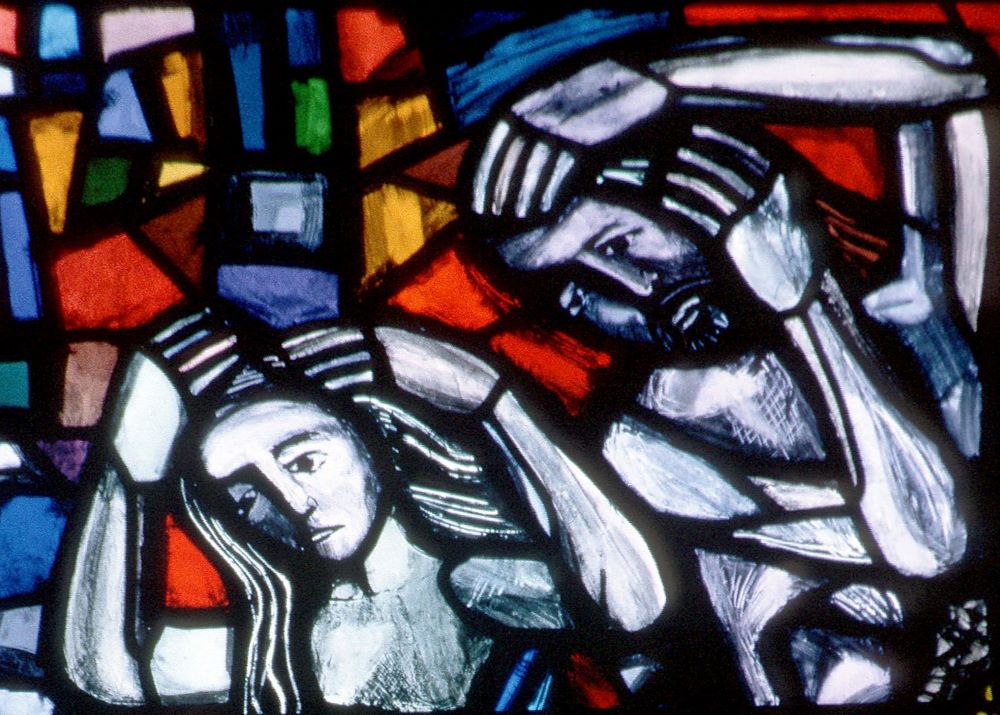
Adam and Eve are depicted in a stained-glass window at St. Nicolas Church in Feldkirch, Austria, on Aug. 2, 2004. (CNS photo/Crosiers)
Do you remember René Descartes? ("I think, therefore I am.") Well, one day Descartes walked into a bar. (Original opening, no?) The bartender looked at him and asked, "Would you like a beer?" Descartes replied, "I think not." Then he disappeared.
As we know, Descartes died (1650), but his ideas haven't disappeared. Today we can argue that Descartes' brilliant thinking undergirds much of modernity's individualism, an approach to life that, according to Pope Francis, can tear the world apart and fosters division. Individualism can grow like cancer and metastasize into nationalism, sexism, homo and xenophobia, etc. But Descartes' theory had a fatal fallacy: He didn't understand that he wouldn't have known what "I" meant if his grandmother had not held him on her lap and said, "I am mémé you are René." Genesis 2 explains this with a theological myth.
Genesis weaves a tale about how God formed an adamah, an earthy creature who reflected God's own Self. God watched the adamah, then, for the first time ever, God said, "It is not good." What was wrong? Adamah was all alone. So, God fashioned all sorts of living creatures to accompany our mythical mudman ancestor. None of them the fellow's need. Finally, God said, "If this poor little creature is to become like us, he needs another who is very similar, yet distinct from himself." Voila! Eve.
When adamah and the woman saw each other, they could not only call one another by name, but they could grow, drawing one another forth through mutual relationship. In this relationship, Eve and Adam initiated our limitless trajectory of growth in humanity, our capacity to be images of the triune, all-relational God. Their relationship served as their first catechism, leading them through the first steps toward a relationship with God whose love called them to life. This ushers us into today's Gospel.
Every experience of love incarnates God with us.
A group of Jesus' antagonists asked him to legislate about the relationship between a wife and husband. Could a man just dump his wife like a pair of worn-out shoes? Jesus replied that legislating about relationships reveals hardness of heart; laws circumscribe what is meant to grow freely. Because all people are made for each other, ignoring or treating another as disposable denigrates both sides. The offended suffers an injury to her/his humanity — and the one dismissing constricts his/her world and humanity by rejecting, rejects the growth offered through relationship.
The letter to the Hebrews sheds a bright light on the sacramental character of relationships. Hebrews, like Philippians 2:6-8, tells us that Christ was made lower than the angels and tasted death. In other words, in the Incarnation, Christ entered into the closest possible solidarity with humanity, sharing our experience, even to death. Why? So that we who share his same origin in God might share his glory. That glory? Relationships of union among God and neighbor that can grow infinitely.
Forgetting that Jesus declared that legislation about relationships reflects hardness of heart (closedness to God), we often interpret today's Gospel as a decree about marriage. But no, these readings reach beyond the single subject of marriage to help us consider the reality that every relationship draws us deeper into divine life.
The biblical myth of Adam and Eve reveals that we human beings are made for one another. Adam had the power to name everything around him, but, until Eve came along, he labeled things that could not name him back, creatures who could not draw him forth in the equality and mutuality that express the deepest dimensions of our humanity. Only together could Eve and Adam become human images of the triune God.
Advertisement
Adam and Eve might be the perfect patron saints for this moment when our church is moving into the second session of the synod on synodality, or, we could say, the synod on becoming more together. The synod, building on and deepening the inspiration of Vatican II, reminds us that in the most profound sense, we are called to live as a church. This means that, rather than think of the church as an institution, we are beginning to realize that it is an experience of togetherness, of being called by God to be and do something together that nobody, not even small groups, can accomplish alone.
From this insight, we realize that every relationship (friendship, marriage, parenting, pastoring, teaching, companioning, serving and being served, etc.) offers us and our world mini experiences of what Jesus called the Reigning of God. Every experience of love incarnates God with us.
Descartes was indeed mistaken. We don't just think that we exist, we know that we become who we are through loving relationships. We know that loving continually makes us more than we were before. As an African saying puts it, "I am because we are."
